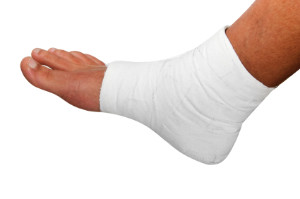 The tarsal tunnel is a canal that exists between the ligaments that spans across the foot and a portion of the ankle bone. The nerves and tendons that are inside this tunnel allow mobility and enable the foot to easily point and flex. If a specific nerve called the tibial nerve inside this canal should become compressed, typically resulting from an injury, this condition is referred to as tarsal tunnel syndrome. Having flat feet is a possible reason for this condition, causing the tibial nerve to become strained. Certain health issues, such as arthritis and diabetes, may also cause the nerve to endure swelling and increased pressure. The nerve must be allowed to heal properly, and this may be accomplished by wearing a brace or supportive shoes. The discomfort that is experienced may be indicative of other foot-related conditions, so it’s advised to consult a podiatrist for a proper diagnosis
The tarsal tunnel is a canal that exists between the ligaments that spans across the foot and a portion of the ankle bone. The nerves and tendons that are inside this tunnel allow mobility and enable the foot to easily point and flex. If a specific nerve called the tibial nerve inside this canal should become compressed, typically resulting from an injury, this condition is referred to as tarsal tunnel syndrome. Having flat feet is a possible reason for this condition, causing the tibial nerve to become strained. Certain health issues, such as arthritis and diabetes, may also cause the nerve to endure swelling and increased pressure. The nerve must be allowed to heal properly, and this may be accomplished by wearing a brace or supportive shoes. The discomfort that is experienced may be indicative of other foot-related conditions, so it’s advised to consult a podiatrist for a proper diagnosis
Tarsal tunnel syndrome can be very uncomfortable to live with. If you are experiencing tarsal tunnel syndrome, contact one of our podiatrists of Foot Health Center of Merrimack Valley. Our doctors can provide the care you need to keep you pain-free and on your feet.
Tarsal Tunnel Syndrome
Tarsal tunnel syndrome, which can also be called tibial nerve dysfunction, is an uncommon condition of misfiring peripheral nerves in the foot. The tibial nerve is the peripheral nerve in the leg responsible for sensation and movement of the foot and calf muscles. In tarsal tunnel syndrome, the tibial nerve is damaged, causing problems with movement and feeling in the foot of the affected leg.
Common Cause of Tarsal Tunnel Syndrome
- Involves pressure or an injury, direct pressure on the tibial nerve for an extended period of time, sometimes caused by other body structures close by or near the knee.
- Diseases that damage nerves, including diabetes, may cause tarsal tunnel syndrome.
- At times, tarsal tunnel syndrome can appear without an obvious cause in some cases.
The Effects of Tarsal Tunnel Syndrome
- Different sensations, an afflicted person may experience pain, tingling, burning or other unusual sensations in the foot of the affected leg.
- The foot muscles, toes and ankle become weaker, and curling your toes or flexing your foot can become difficult.
- If condition worsens, infections and ulcers may develop on the foot that is experiencing the syndrome.
A physical exam of the leg can help identify the presence of tarsal tunnel syndrome. Medical tests, such as a nerve biopsy, are also used to diagnose the condition. Patients may receive physical therapy and prescriptive medication. In extreme cases, some may require surgery.
If you have any questions please feel free to contact one of our offices located in North Andover, and Tewksbury, MA . We offer the newest diagnostic and treatment technologies for all your foot and ankle needs.








